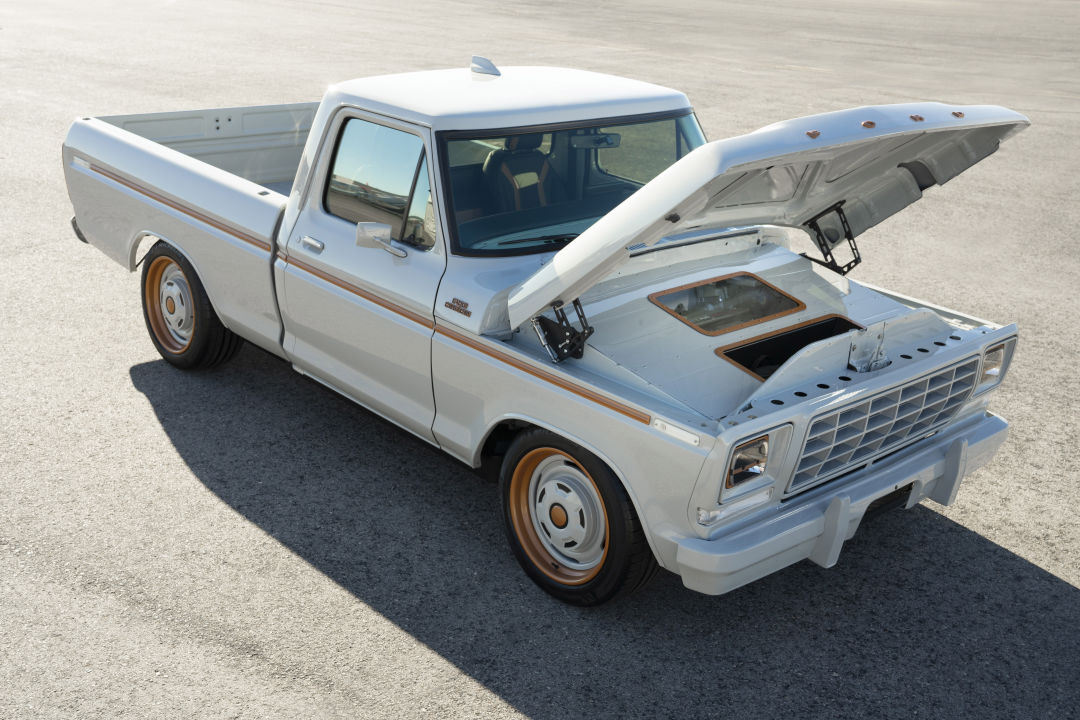Ellen Hughes-Cromwick on What the New Infrastructure Law Means for Climate Change and Electric Vehicles

Ford's all-electric F-100 concept vehicle.
Image: Courtesy Photo
Ellen Hughes-Cromwick has a lot to pay attention to these days.
A senior resident fellow at Third Way, a D.C. think tank, she specializes in studying America's transportation sector as it transitions to renewable energy, drawing on her background at Ford Motor Company and the U.S. Department of Commerce. She's tracking the nuances of the Infrastructure Investment and Jobs Act, which passed Congress this week, as well as the ongoing negotiations over the Build Back Better Act, President Joe Biden's sweeping social and environmental policy bill, both of which could have a far-reaching effect on the nation's energy and transportation systems.

Ellen Hughes-Cromwick.
Image: Courtesy Photo
To help us make sense of those changes, next Friday, Nov. 19, Hughes-Cromwick will remotely address the Climate Adaptation Center's Florida Climate Forecast Conference, which will take place at the University of South Florida Sarasota-Manatee, 8350 N. Tamiami Trail, Sarasota.
Hughes-Cromwick spoke this week about what the infrastructure legislation means for the future of electric vehicles and more and why she's optimistic that we can decarbonize our economy. The interview has been edited and condensed for clarity.
What do you see in the infrastructure bill that's good for addressing climate change?
"The infrastructure package that President Biden will sign into law next week, as well as the Build Back Better framework that is working its way through the House of Representatives right now, will be significant steps toward decarbonization. These massive legislative initiatives are going to help us in the transition to net zero by 2050.
"In the bipartisan package, there's $7.5 billion allocated for charging infrastructure. Out of that, $5 billion is solely for electric vehicle charging. The other $2.5 billion will include money for, say, a business that wants to set up hydrogen fuel cell charging infrastructure. They can apply for funds for that.
"This is going to be a big step forward. It will allow for at least 500,000 new plugs across the U.S. in really important areas where access has been limited. It's going to be a very critical step to facilitating 50 percent electric vehicle penetration in the U.S. by 2030. That's a massive step forward."
What about the Build Back Better proposals that are being discussed right now?
"That legislation may have important electric vehicle purchase credits that will allow somebody to, right at the dealership or online, take off $7,500 from the price of an electric vehicle. That is going to get us to the point of an acceleration in electric vehicle production and sales here in the U.S."
The infrastructure bill has passed. The Build Back Better bill is still being negotiated. If we just get one and not the other, what's the negative effect? Why do we need both?
"We can help facilitate building out the infrastructure charging with what's in the infrastructure package, but we won't get to an acceleration in E.V. sales without the purchase credit. And the reason is that, between now and 2025, we still have relatively high battery costs in electric vehicles.
"In other words, if you go into the dealership and you look at a gasoline-powered Mustang versus the Mach-E, there's still a little bit of a price differential, because the battery pack is still expensive. What the purchase credit does is squeeze down that gap between the pricing of a gasoline-powered vehicle and the pricing of an electric vehicle.
"Now, this isn't going to be in place forever. The legislation has a phase-out. Once we get to 50 percent E.V. sales, that purchase credit begins to phase down toward zero. And I think that's totally appropriate. We don't want these incentives around forever.
"We need a competitive industry. But we've got to get there fast because the competition is beating us. We've got China, with massive subsidies to stand up dozens and dozens of electric vehicle companies, and Europe also, with very stringent CO2 regulations and fines. If you're VW and you don't meet that CO2 regulation for the fleet of vehicles you're producing, you have to pay very significant penalties. We don't have anything like that here in the U.S.
"So this purchase incentive is going to nudge us and get us to a competitive spot faster than what the market alone would deliver."
It seems like auto manufacturers are very rapidly shifting to electric vehicles. What has fueled that quick turnaround?
"There are a couple of things. One is that the competition is intense. As I just mentioned, in China, in Europe, they've been subsidizing and putting policies in place for several years now. And I think our domestic manufacturers, as well the startups, realize, 'Oh my God, we've got to get going here or we're going to lose our competitive position in those markets.'
And then, once you figure out that kind of business plan, you say, 'Why do I want to have a supply chain for gasoline-powered vehicles, and then on top of that a supply chain for electric vehicles?' There are some economies of scale as you think about what your business plan looks like.
"And I do think that the announcement of the Biden administration in the beginning of this year that we want to get to 50 percent electric vehicles made these companies move faster than they would have otherwise."
You mentioned that Europe has strict CO2 regulations. Why is the approach that the Biden administration is taking better than just having strict caps on CO2 emissions?
"There is a political economy associated with stringent regulations. We did have, in the Obama administration, an effort to increase fuel economy standards to make them more stringent. That was repealed during the Trump administration. Now, we are seeing the Biden administration set up for a potential industry-wide increase in fuel economy standards.
"I would call it the carrot and the stick. In Europe, they're more interested in the stick of CO2 regulations. It's just the way that their political economy has developed. They've got big gas taxes. When you roll up for gasoline in Germany, you're paying $8, $9 a gallon. We just don't have those kinds of tax structures here in the U.S.
"We've taken more of a carrot-stick approach in that these purchase incentives allow the marketplace to still determine the pace of demand. We're not dictating, 'Hey, you've got to make 50 percent E.V. sales.' We're trying to put the incentives in place to deliver that kind of outcome."
If you get an electric vehicle, but you're still plugging it into an electrical grid that's based on natural gas or coal, is that even that much of an improvement?
"It really depends on where that electric vehicle is being driven, because if you've got coal-fired electricity in your neighborhood, you're not going to be contributing to lowering emissions as much. There still is an incremental improvement. Don't get me wrong. The message for people is, 'You are still benefiting, because you're not spewing out emissions from a tailpipe. However, if it's coal-fired, you're not going to get the full benefit of the electric vehicle.'
"That's why these other provisions in both infrastructure and Build Back Better are important, so that we get to more renewable energy on the grid, that we get better research, development and deployment of battery storage on the grid and transmission. The transmission infrastructure that's in the package is critical, so that we can send wind from the middle of the country out to the east coast. We need an upgrade to our transmission. That's going to be a big deal. That will help facilitate even better emissions reductions when you drive an E.V."
Is there enough in these bills to make a serious dent in making our grid more renewable?
"There's a really good model that's been developed by Jesse Jenkins at Princeton University that has looked at what kind of decarbonization will result from the implementation of this policy. And his latest reading on that is that it looks like it's going to help reduce emissions by 50 percent, compared to 2005 levels."
A lot of people feel despair when they think about climate change. How do you frame these issues to get people inspired or excited instead?
"The thing that's really exciting to me is how vibrant our private sector is, and the amount of innovation that's taking place. I look, for example, at what's happening in the research and development around solid-state batteries, which is going to be the next generation. We have incredible entrepreneurs in the U.S. who are leading on these new battery chemistries that are going to deliver greater energy density. That means longer range. So if I put the same weight of a battery in an E.V., but it's solid-state, I'm going to be able to drive 500 miles on a single charge, as opposed to 300. That's just one item.
"Our private sector has creativity and innovation around these clean technologies. That gives me significant optimism. And we have the investment community that's willing to put dollars into that kind of enterprise. I can't think of another place on the planet that has that kind of culture of creativity and technology."
You can hear Ellen Hughes-Cromwick and other climate experts at the Climate Adaptation Center's all-day 2021 Florida Climate Forecast, 8 a.m.-5 p.m. Friday, Nov. 19, at the University of South Florida Sarasota-Manatee's Selby Auditorium, 8350 N. Tamiami Trail, Sarasota. Tickets for the live and livestream event are $65.



